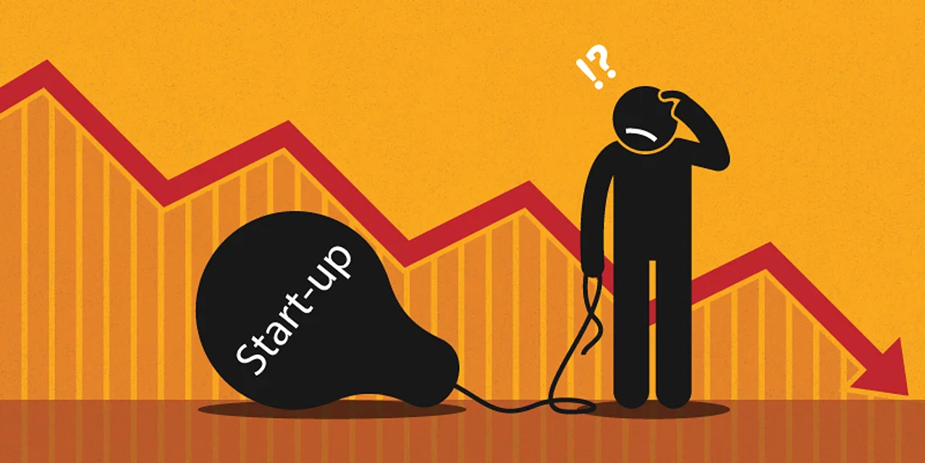
Copyright infringement not intended
Context: The Indian startup ecosystem witnessed a sharp decline in the number of new unicorns in 2023, as per a report, titled ASK Private Wealth Hurun Indian Future Unicorn Index 2023. The report said that only three startups achieved a valuation of more than $1 billion in 2023, compared to 24 in the previous year. The total number of unicorns also dropped to 83 from 84 in the same period.
Details
- The report attributed the slowdown in unicorn creation to the "slowdown in India's startup ecosystem", which has been facing a "funding winter" due to lower investor interest and confidence.
- The report also said that many startups have adopted unsustainable business models that have resulted in lower valuations and exits.
- The report also expressed optimism about the future of the Indian startup scene, saying that funding is still available for the right companies and that India has the potential to create 200 unicorns in the next five years.
- The report classified these startups into unicorns, gazelles (valued at over $500 million and likely to become unicorns in three years) and cheetahs (valued at over $250 million and likely to become unicorns in five years).
- The report cited China's example, where there are over 1,000 unicorns, and said that startups are crucial for India's economic growth

Indian Startup Ecosystem
- India is one of the fastest-growing startup ecosystems in the world, with more than 50,000 startups registered as of 2020. However, the COVID-19 pandemic has severely impacted the growth and survival of many startups, especially in sectors such as travel, hospitality, entertainment, and retail.
- According to a report by Nasscom, about 40% of Indian startups had to halt their operations or pivot their business models due to the crisis. The report also estimated that the Indian startup ecosystem lost 15% of its value in 2020, compared to a 45% increase in 2019.
What are the reasons for the slowdown in the Indian startup ecosystem?
Reduced consumer demand and spending
- The lockdowns and social distancing measures imposed by the government to contain the spread of the virus have resulted in a sharp decline in consumer demand and spending across various sectors. This has affected the revenue and profitability of many startups, especially those that rely on offline channels or discretionary spending.
Disrupted supply chains and logistics
- The pandemic has also disrupted the supply chains and logistics of many startups, especially those that depend on imports or exports of raw materials, components, or finished goods. The restrictions on international and domestic travel and transportation have caused delays, shortages, and increased costs for many startups.
Limited access to capital and liquidity
- The pandemic has also created a liquidity crunch for many startups, as investors have become more cautious and selective in funding new ventures. According to a report by Tracxn, the total funding raised by Indian startups in 2020 was $11.5 billion, a 10% drop from $12.8 billion in 2019. Moreover, many startups have faced difficulties in meeting their operational expenses, such as salaries, rent, taxes, and debts.
Regulatory and policy uncertainties
- The pandemic has also brought some regulatory and policy challenges for the Indian startup ecosystem, such as the changes in the foreign direct investment (FDI) norms that restrict investments from neighbouring countries, including China.
- China is one of the largest sources of funding for Indian startups, accounting for about 30% of the total funding raised by Indian startups in 2019. The FDI changes have created hurdles for many existing and potential investors from China to invest in Indian startups.
Impact of the Slowdown on the Indian startup ecosystem
Funding
- According to a report by Nasscom, the total funding raised by Indian startups in 2020 was $11.5 billion, a 10% decline from $12.8 billion in 2019. The number of deals also decreased by 14%, from 1,185 in 2019 to 1,023 in 2020.
- The report also noted that only seven startups achieved unicorn status (valuation of over $1 billion) in 2020, compared to nine in 2019.
Growth
- The slowdown in funding also impacted the growth of Indian startups, as many of them had to cut costs, lay off employees, or pivot their business models to survive.
- According to a survey by LocalCircles, 47% of Indian startups and SMEs reported a revenue decline of over 40% in 2020, while 23% reported a revenue decline of over 80%. The survey also found that 38% of Indian startups and SMEs reduced their workforce by more than 40% in 2020, while 15% shut down their operations completely.
Innovation
- The slowdown in funding and growth also affected the innovation potential of Indian startups, as they had to focus more on survival than on creating new products or services.
- According to a report by TiE Delhi-NCR and Zinnov, the number of new startups launched in India in 2020 was 1,600, a 29% decline from 2,250 in 2019. The report also noted that only three sectors - edtech, healthtech, and fintech - accounted for 50% of the new startups launched in 2020, indicating a lack of diversification and experimentation in other sectors.
Challenges faced by the startups'
Cash flow and liquidity
- One of the biggest challenges faced by Indian startups during the slowdown was managing their cash flow and liquidity. Many startups faced difficulties in raising funds from investors, who became more cautious and selective due to uncertain market conditions.
- Some startups also faced delays or defaults in payments from their customers or suppliers, affecting their working capital and cash reserves. As a result, many startups had to resort to debt financing or bridge funding to meet their operational expenses.
Survival and sustainability
- Another challenge faced by Indian startups during the slowdown was ensuring their survival and sustainability. Many startups had to rethink their value proposition and customer segments, as the pandemic changed consumer behaviour and preferences.
- Some startups had to pivot their business models or enter new markets to adapt to the changing demand and supply scenarios. Some startups also had to reduce their burn rate and optimize their resources to extend their runway and stay afloat.
Talent retention and acquisition
- A major challenge faced by Indian startups during the slowdown was retaining and acquiring talent. Many startups had to lay off or furlough their employees or cut their salaries or benefits to save costs. This affected their morale and productivity, as well as their ability to attract and retain talent.
- Some startups also faced difficulties in hiring new talent, as they had to compete with larger or more stable companies or offer higher compensation or incentives.
Steps taken by the government to support the ecosystem
Aatmanirbhar Bharat Abhiyan
- The government launched a stimulus package of Rs 20 lakh crore ($266 billion) under the Aatmanirbhar Bharat Abhiyan (Self-reliant India Movement) to boost various sectors of the economy affected by the pandemic.
- The package included several measures for MSMEs (Micro, Small and Medium Enterprises), such as collateral-free loans, equity infusion, subordinate debt relief, etc., which also benefited some startups.
Startup India Seed Fund Scheme
- The government announced a Startup India Seed Fund Scheme of Rs 945 crore ($126 million) to provide seed funding to eligible startups. The scheme aims to help startups in their early stages of growth, especially in sectors such as social impact, biotechnology, healthcare, education, agriculture, etc.
- The scheme also aims to encourage incubators to support startups and create a robust startup ecosystem in the country.
Relaxation of norms and regulations
- The government also relaxed some norms and regulations for startups to ease their compliance burden and facilitate their growth. For instance, the government extended the tax holiday for startups by one more year, till March 31, 2022.
- The government extended the capital gains exemption for investment in startups by one more year, till March 31, 2022.
- The government simplified the process of setting up a one-person company (OPC) and allowed NRIs (Non-Resident Indians) to incorporate OPCs in India.
Recovery and resilience
- The Indian startup sector has shown signs of recovery and resilience in 2021, as the vaccination drive and the easing of lockdowns have improved business sentiment and consumer confidence.
- According to a report by Nasscom, the Indian startup ecosystem added 12 unicorns in the first half of 2021, surpassing the total number of unicorns added in 2020. The report also noted that the total funding raised by Indian startups in the first half of 2021 was $10.8 billion, a 2x increase from $5.4 billion in the first half of 2020.
However, there are still some challenges and uncertainties that need to be addressed for the sustained growth and innovation of the Indian startup sector.
Steps that can be taken
- Strengthening the collaboration and coordination among the government, the industry, the academia, and civil society to create a conducive and supportive environment for startups.
- Fostering a culture of innovation and entrepreneurship among the youth and the students, by providing them with mentorship, guidance, training, and exposure to the best practices and opportunities in the startup domain.
- Enhancing the access and availability of capital, talent, infrastructure, and markets for startups, especially in tier-2 and tier-3 cities and rural areas, where there is a huge potential for innovation and social impact.
- Leveraging digital transformation and emerging technologies such as artificial intelligence, blockchain, cloud computing, etc., to create new products or services or improve existing ones that can solve real-world problems and create value for customers.
- Building resilience and agility among startups to cope with the changing scenarios and risks, by adopting lean and agile methodologies, diversifying their revenue streams, expanding their customer base, etc.

Conclusion
- The Indian startup ecosystem has faced a slowdown due to the COVID-19 pandemic, but it has also demonstrated its recovery and resilience in the post-pandemic world. The government has taken several steps to support the ecosystem during the slowdown, but there is still scope for improvement and intervention. The way forward for the Indian startup sector is to leverage its strengths and opportunities, overcome its weaknesses and threats, and emerge as a global leader in innovation and entrepreneurship.
Must-Read Articles:
Start-Up in India: https://www.iasgyan.in/daily-current-affairs/start-up-in-india
|
PRACTICE QUESTION
Q. The Indian startup ecosystem has witnessed a slowdown in recent years due to various factors such as lack of funding, regulatory hurdles, market saturation and competition. How has this slowdown affected the growth and innovation of the startups? What steps has the government taken to support and revive the startup sector? What is the way forward for the Indian startup ecosystem to regain its momentum and achieve its potential?
|
https://economictimes.indiatimes.com/tech/startups/slowdown-visible-in-indias-startup-story-as-only-three-unicorns-added-in-2023-report/articleshow/101310198.cms?utm_source=contentofinterest&utm_medium=text&utm_campaign=cppst
















